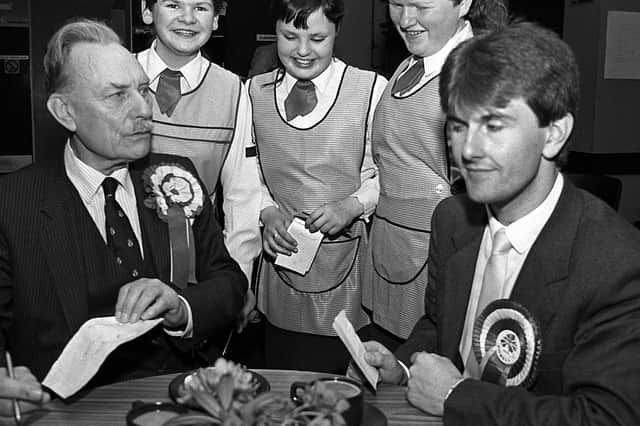Henry McDonald: Columnist is ludicrously spooked by the spirit of Enoch Powell


Although Enoch Powell has been dead for just under a quarter of a century the former South Down MP it seems is disturbing the dreams of the Irish Times’ chief commentator this weekend.
In his latest outburst of post-Brexit unionist-bashing O’Toole suggests that what is really animating the current leading figure in unionism, Jeffrey Donaldson, is the spirit of Powell.
Advertisement
Hide AdAdvertisement
Hide AdTo be fair the Democratic Unionist leader is a life-long admirer of the man his predecessor Dr Ian Paisley once dismissed contemptuously as “the Wolverhampton Wanderer”.
When Sir Jeffrey was still in the rival Ulster Unionist Party Enoch Powell was one of his heroes. Which was ill judged given that Powell’s old style, outdated colonialist outlook was never going to be a good advertisement for unionism in any form, and certainly not in the 21st century.
Nonetheless, to suggest that Powell is animating the current position of the DUP and indeed all the major unionist parties is an absurd exaggeration.
O’Toole caricatures their opposition to the Northern Ireland Protocol as akin to being on a ghost train driven by Powell. He clearly needs to get out more especially up in Northern Ireland where he should engage with the voters that support those parties.
Advertisement
Hide AdAdvertisement
Hide AdWhether you are unionist, nationalist or neither it might be a good idea to open a dialogue with the people you are excoriating rather than telling us it was all Enoch Powell’s fault.
With the noble exception of Stephen Collins’ intrinsically sensible columns, this type of commentary typifies the dismissive, patronising and ill-informed analysis you tend to get about Northern Ireland these days from the Republic’s paper of record.
To suggest that Enoch Powell exercises any real influence over current unionist political thinking is itself a throwback to different days.
Powell’s dismal vision of a UK torn apart by racial divisions has been by and large proved wholly wrong. The country is a far more tolerant and open society than it was when Powell made his hysterical ‘Rivers of Blood’ prophecy at the end of the 1960s. The UK’s strength today lies pace Powell in its ethnic and racial diversity, a quality that all the advocates of the Union should be advancing and hailing.
Advertisement
Hide AdAdvertisement
Hide AdIt is also outrageous that O’Toole fails to mention the impact of the IRA’s violent campaign on Jeffrey Donaldson’s background and thinking.
The DUP MP’s uncle Samuel was one of the first RUC officers murdered by the Provisionals at the start of the Troubles. Throughout three decades of sectarian conflict Donaldson attended many funerals of his constituents, friends and wider family circle who were targeted in that violence. Again, you can be unionist, nationalist or neither or indeed either pro or anti EU but surely no one should ignore the immense and dark influence of those murders and trauma on the development of a politician’s career.
O’Toole also references Ted Heath for sacking Powell from the Tory cabinet over his infamous speech. The irony is that Heath presided over policies in Northern Ireland that had disastrous consequences for Northern Ireland. It was Heath not Powell who pushed for the catastrophic decision to impose internment in Northern Ireland. And it was Heath’s government that sent the Parachute Regiment into Londonderry in 1972 leading to the Bloody Sunday massacre. Heath’s legacy, not Powell’s, is the one that haunts this society to this day.
As for Brexit O’Toole tries in his column to bequeath the UK leaving the EU to the legacy of Enoch Powell. He forgets that the European Union or what was then the EEC also had its critics from the left as well as the right. One of the most outspoken Eurosceptics on the British political landscape for decades was also one of the strongest advocates for a united Ireland in the House of Commons. His name was Tony Benn.
Advertisement
Hide AdAdvertisement
Hide AdThere were lots of leftists too in the Republic of Ireland who protested over what the EU, the European Central Bank and the IMF were doing to Ireland when the Celtic Tiger collapsed during the global financial crash of the mid 2000s. Thousands of them marched through the centre of Dublin to demonstrate against the austerity programme imposed on the Irish from Brussels and Frankfurt. They even included a certain newspaper columnist who denounced the Eurocrats and bankers for their perfidy from the back of a lorry in O’Connell Street.